Tonight's Black Moon: A Simple Guide to Understanding This Rare Lunar Event
Tonight's sky holds a celestial mystery for those who look up: a Black Moon. But what exactly is a Black Moon, and why is it considered so rare? This simple guide will demystify this fascinating lunar phenomenon.
What is a Black Moon?
Unlike a Blood Moon or Blue Moon, a Black Moon isn't about a moon's color or its size. Instead, it refers to the second new moon in a single calendar month. Because the lunar cycle is approximately 29.5 days, and most months are 30 or 31 days, this rare event can occur. The new moon phase, remember, is when the sunlit side of the moon is facing away from the Earth, rendering it invisible to us. Thus, a Black Moon – the invisible new moon – is a truly unique celestial event.
Why is a Black Moon Rare?
The rarity of a Black Moon stems from the mismatch between the lunar cycle and our calendar months. It's not a regular occurrence, and therefore a worthwhile event for sky watchers. While a Blue Moon (two full moons in a month) happens relatively more frequently, the second new moon in a month is a less common event.
How to "See" a Black Moon
You won't be able to see a Black Moon in the traditional sense. Since it's a new moon, it's not visible to the naked eye. However, you can still experience its significance by considering it a time for reflection, introspection, and new beginnings. Many associate new moons with setting intentions and starting fresh, making a Black Moon an especially potent time for such practices.
Black Moon vs. New Moon: Key Differences
While the core difference is the timing within a month, it's helpful to clarify:
- New Moon: The first new moon in a calendar month is a regular monthly event.
- Black Moon: The second new moon in a calendar month. This is the rare occurrence.
Black Moon Folklore and Symbolism
Throughout history and across various cultures, the new moon, and by extension the Black Moon, has been associated with mystery, introspection, and the potential for hidden growth. Some consider it a time for releasing negativity, setting intentions, and embracing change.
Observing the Night Sky: Beyond the Black Moon
While you won't visually observe the Black Moon itself, take the opportunity to appreciate the rest of the night sky. Look for other constellations, planets, and stars visible in your area. Using a stargazing app can enhance your experience.
Conclusion: Embrace the Mystery
A Black Moon is a subtle but significant celestial event, reminding us of the rhythm and cycles of the universe. While it's not visible to the naked eye, its rarity makes it a moment to appreciate the hidden wonders of our solar system and reflect on the cyclical nature of life. So, even though you can't see it, mark tonight as a memorable celestial moment.

